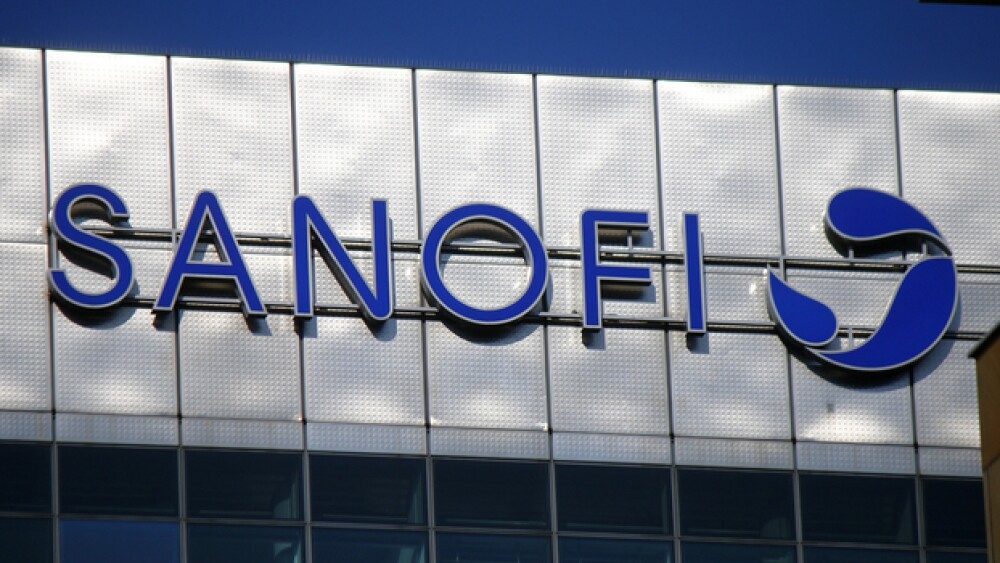The French company has an age limit for its top official and the company is working on a succession plan in anticipation of that change.
360b / Shutterstock.com
Olivier Brandicourt will step away from his role as chief executive officer of Sanofi next year after he turns 65. The French company has an age limit for its top official and the company is working on a succession plan in anticipation of that change.
A company spokesperson told Reuters that it was the responsibility of the board of directors to plan for succession of the next CEO and to identify the “next set of future leaders” of the company. The spokesperson said the board, in “agreement and consultation” with Brandicourt, has been working on the succession plan for some time. Citing unnamed sources, Reuters said those discussions of who will lead the company next have “intensified” over the past few weeks as the company plans its annual shareholders meeting next month. During that meeting, the shareholders will be asked to support a call to “renew the mandate of the board’s chairman, Serge Weinberg,” Reuters said.
Brandicourt has helmed Sanofi since 2015. Prior to this time at the French company, he headed up the healthcare arm at Germany-based Bayer. Since taking over the reins of Sanofi, he has been instrumental in reshaping the company, including a deal to swap Sanofi’s animal health business with Germany-based Boehringer Ingelheim for that company’s consumer healthcare operations. He has also played a significant role in the company’s developmental partnership with Regeneron that has led to multiple regulatory wins for Dupixent. This month, the U.S. Food and Drug Administration approved Dupixent as a treatment or adolescent patients 12 to 17 years of age with moderate-to-severe atopic dermatitis whose disease is not adequately controlled with topical prescription therapies or when those therapies are not advisable.
Dupixent is also approved in the U.S. for the treatment of adult patients with moderate-to-severe atopic dermatitis (eczema), and for use with other asthma medicines for the maintenance treatment of moderate-to-severe asthma in people aged 12 years and older whose asthma is not controlled with their current asthma medicines. Those approvals of Dupixent, which targets the IL-4/IL-13 pathway, have helped bring Sanofi back to the profitable side of the ledger after the company took some financial hits over its declining diabetes sales, Reuters said.
Last month Sanofi snagged another approval for its rare blood disorder treatment, Cablivi. The FDA approved for treatment for acquired thrombotic thrombocytopenic purpura. It’s the first approved treatment for this indication. Cablivi is expected to become a cornerstone of the company’s new rare blood disorders franchise. Cablivi is an anti-vWF nanobody and Sanofi’s first Nanobody-based medicine to receive approval in the U.S. Sanofi acquired Cablivi last year when the company snapped up Belgium-based Ablynx for $4.8 billion.
Sanofi has also had some controversy under the tenure of Brandicourt, particularly around its Dengue vaccine, Dengvaxia. The vaccine first earned approval in 2015 and has recently won approval in Europe. The company is hoping for approval in the U.S. in May. However, in the Philippines, where it has been in use for some time, Dengvaxia has been a sore point for the Philippines. In 2017 it was reported that the Dengue vaccine could actually worsen the symptoms of the illness in people who had previously not been exposed to the virus. Sanofi said the analysis showed more cases of severe disease could occur following vaccination in patients who had not been previously infected by the dengue virus. The Philippines has halted the use of Dengvaxia in that country. The government of that country is planning legal action against Sanofi. The Department of Justice said it found probable cause to indict Sanofi officials over 10 deaths it claims are linked to the Dengvaxia vaccine.





